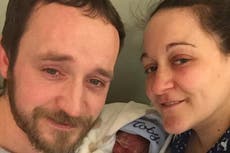Coroner calls for action on plans for inquests into stillborn babies after baby dies from ‘excessive force’ in forceps delivery
Baby Freddie died when his skull was fractured during a traumatic birth attempt in November last year

A coroner has urged ministers to revisit plans to make it possible to hold inquests into babies that are stillborn after a baby died due to “excessive force” during an attempted forceps delivery.
Senior coroner Caroline Beasley-Murray has written to the Ministry of Justice after she was forced to stop hearing evidence into the death of baby Frederick Terry, known as Freddie, who died under the care of the Mid and South Essex Hospitals Trust on November 16, last year.
An inquest into his death was started in September where Freddie was found to have died after suffering hypovolaemic shock as a result of losing a fifth of his blood when his skull was fractured during a traumatic birth attempt.
In a report on the case the coroner said: “Baby Frederick Joseph Terry was delivered by caesarean section, after a failed forceps attempted delivery on 16 November 2019 and death was confirmed after 40 minutes of resuscitation attempts.
"The evidence showed that baby Freddie's very serious scalp and brain injuries were sustained during the failed forceps attempted delivery and, but for these, baby Freddie would have survived as a perfectly formed, healthy baby."
The coroner said the injuries he sustained implied “an excessive degree of force” in the application of the forceps, which are curved metal instruments that fit around a baby’s head and are designed to help deliver the baby.
The inquest had to be stopped from hearing any more evidence because coroners are not able to investigate stillborn babies.
As part of her report, the coroner said: “It would have been helpful for there to have been, during the course of the inquest, an exploration, in the course of evidence, of the treatment and care provided to baby Freddie and his parents at the time of delivery.
“Currently there is no legislation to cover the holding of a coroner’s inquest into a stillbirth. In March 2019, the Government issued a consultation on coronial investigations of stillbirths It would be helpful for this important topic to be progressed, whatever the ultimate jurisdictional decisions.”
Mrs Beasley-Murray found 11 matters of concern in her investigation of Freddie’s death.
These included:
- An excessive degree of force in the application of the forceps
- A lack of risk assessment before delivery
- The forceps delivery was attempted without recognising the baby was in the wrong position.
- Concerns about the engagement and induction of locum staff and management of staff levels on the maternity ward
- The need for a bleep in the neonatal unit
- Accuracy of record keeping
- Training and procedures in respect of communications between clinicians in theatre
- Training and procedures in respect of communications with the family
- Availability and suitability of resuscitation equipment and procedures on the maternity ward
It is estimated around one in every 225 births is a stillbirth, around 3,400 babies every year.
The Healthcare Safety Investigation Branch has warned of a rise in stillbirths during the coronavirus pandemic and is planning to release an investigation on the rise early next year.
The Mid and South Essex Hospitals Trust has faced criticism for maternity safety earlier this year. Inspectors raised concerns about the trust’s Basildon hospital site after six babies needed cooling to avoid brain damage.
Earlier this month, the Care Quality Commission wrote to the trust highlight unsafe staffing levels and that not enough action had been taken. The coroner did not say in which hospital run by the trust Freddie was born.
Diane Sarkar, chief nursing officer for Mid and South Essex NHS Foundation Trust, said: "Our thoughts and sympathies remain with Frederick's family and loved ones, and we are deeply sorry for the failings in his care.
"We have been determined to learn from Frederick's death, and we have strengthened our practices, introduced enhanced staff training, and embedded more robust guidelines to ensure that the quality of care at the Trust continues to improve.”
Join our commenting forum
Join thought-provoking conversations, follow other Independent readers and see their replies
Comments


Bookmark popover
Removed from bookmarks